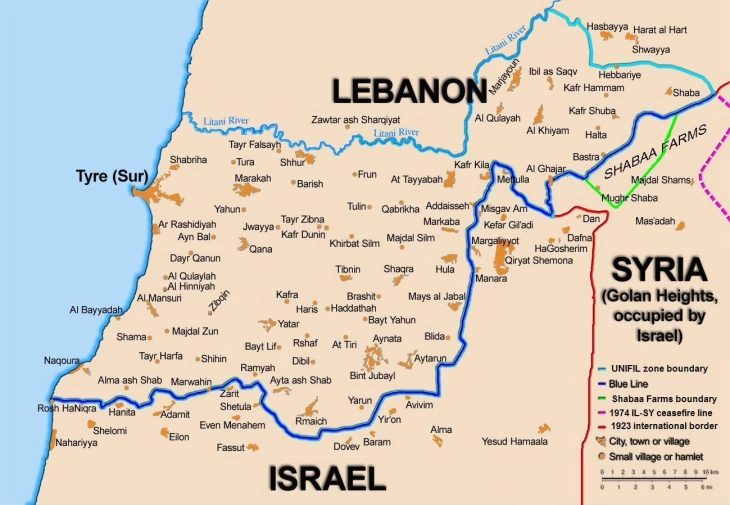Israel strikes ancient city of Baalbek, advances in southern Lebanon
- Israeli airstrikes on Wednesday killed a total of 19 people in the area of the ancient city of Baalbek in eastern Lebanon, the Lebanese Health Ministry said.

Beirut/Tel Aviv, 31 October 2024 (dpa/MIA) - Israeli airstrikes on Wednesday killed a total of 19 people in the area of the ancient city of Baalbek in eastern Lebanon, the Lebanese Health Ministry said.
A strike killed 11 people in the village of Mazrat Beit Salibi, according to a breakdown given by the ministry.
Another strike in the town of Bednayel, also in the Baalbek area, killed eight others, it added.
Earlier Wednesday, the Israeli military struck Baalbek after calling for evacuations, witnesses said.
"The whole city of Baalbek was shaking as loud sounds of explosions were heard," a witness told dpa. Residents earlier fled the affected areas in panic as loudspeakers in mosques across Baalbek called on people to leave the city.
Around 80,000 people live in Baalbek, which is known for its Roman temples that have been designated a UNESCO World Heritage Site.
In addition, many internally displaced civilians have sought refuge in the area - considered a Hezbollah stronghold - since Israel launched its ground offensive in southern Lebanon in late September.
Israeli troops advance in southern Lebanon
Also on Wednesday, the Lebanese news agency NNA said that Israeli troops were trying to enter the key town of Khiam.
A witness in the area told dpa that Israeli forces entered the town from the east. According to NNA, several Israeli tanks had already advanced to the eastern outskirts of Khiam on Tuesday.
The troops attempted to enter the city "under heavy fire cover from fighter jets, drones and artillery," NNA reported.
Hezbollah meanwhile claimed responsibility for several rocket attacks on Israeli soldiers in Khiam.
The Israel Defense Forces (IDF) did not confirm the report, but said that ground troops "continued limited, localized, targeted raids against Hezbollah targets in southern Lebanon."
"The troops located large quantities of weapons, dismantled tunnel shafts, eliminated terrorists and destroyed Hezbollah launchers embedded in civilian areas and aimed at Israeli communities," it added.
In the past day, the Israeli Air Force also "struck over 100 Hezbollah terror targets and eliminated dozens of Hezbollah terrorists throughout Lebanon," the IDF said.
According to Lebanese reports, a number of civilians were killed in the attacks.
US envoy travels to Israel for crunch talks
The latest reports came amid cautious optimism about a ceasefire in the region, which has seen fighting escalate since the Palestinian militant group Hamas and others launched the October 7 attacks on Israel, killling some 1,200 and taking about 250 hostage.
Lebanon's caretaker Prime Minister Najib Mikati said he hoped a ceasefire between Israel and the Hezbollah militia could be reached in "days."
Mikati made the comments to the Al Jadeed broadcaster, hours after new Hezbollah leader Naim Qassem said the Iran-backed group was open to ending the war with Israel under certain conditions.
Israeli media reported on Wednesday that US envoy Amos Hochstein is to travel to Israel on Thursday for talks along with White House Middle East coordinator Brett McGurk.
The Israeli army radio station said that an agreement could be concluded "within days," citing the Israeli military.
According to media reports, Israeli Prime Minister Benjamin Netanyahu held urgent talks on Tuesday on possible ways out of the war.
Israel is calling for Hezbollah to withdraw to the area north of the Litani River, as provided for in a UN resolution. The resolution also allows for a large number of Lebanese soldiers to be stationed along the Israeli border.
New Hezbollah leader hints at ceasefire in first speech
In perhaps another sign of progress towards a potential ceasefire, the newly appointed leader of Hezbollah on Wednesday said the militia was open to ending the war with Israel under certain conditions.
Qassem, the organization's new secretary general, said in a televised speech: "If the Israelis decide that they want to stop the aggression, we will accept that - if we find the terms to be acceptable."
In his first address since he was appointed to replace former leader Hassan Nasrallah, who was killed in an airstrike in September, Qassem stressed that the movement would "not beg for a ceasefire."
"The enemy must know that the bombing of Lebanese villages and towns will not force the militia to retreat," he said.
Qassem, who was previously the group's deputy chief, pledged that Hezbollah would emerge victorious from this battle.
"We have the ability to remain resilient for days, weeks and months," he added.
Further fighting in Gaza
Qassem's comments came as fighting continued in Gaza, one day after at least 93 Palestinians were reported killed in an Israeli strike in the northern city of Beit Lahia.
In the latest attacks, the IDF claimed strikes on militants from Hamas and the extremist Islamic Jihad group within a humanitarian zone in the southern city of Khan Younis.
The IDF said in a Telegram post that it carried out a "precise strike" on militants who were "conducting terrorist activity" in the zone.
"This is a further example of the Hamas terrorist organization's systematic abuse of civilian infrastructure and use of the humanitarian area as cover for their terrorist attacks and in violation of international law," the IDF said.
There were also renewed skirmishes around the Jabalia refugee camp, where the IDF said "troops eliminated dozens of terrorists during aerial strikes and in close-quarters encounters."
The Israeli military's statements could not be independently verified.
The Hamas-run Health Ministry says has the conflict has resulted in more than 40,000 people dead. Israel has come under international criticism given the high number of civilian casualties and dire humanitarian situation in Gaza.







